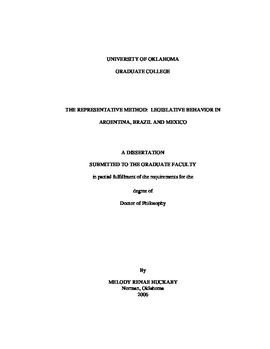| dc.contributor.advisor | Copeland, Gary W., | en_US |
| dc.contributor.author | Huckaby, Melody Renae. | en_US |
| dc.date.accessioned | 2013-08-16T12:20:18Z | |
| dc.date.available | 2013-08-16T12:20:18Z | |
| dc.date.issued | 2006 | en_US |
| dc.identifier.uri | https://hdl.handle.net/11244/1054 | |
| dc.description.abstract | This dissertation presents a model which examines three facets of representation. The study of legislative representation has been discussed within the categories of representative focus, constituency responsiveness, and representative goals. I argue that only through the combination of these three categories can a full understanding of individual level representation occur, and the prioritization of the subsets within representative focus, constituency responsiveness, and representative goals create a Representative Method for legislators. Since the focus, responsiveness, and goals of legislators are correlated to the gender of the legislator, and to a lesser extent, the party membership and experience of the legislator and the particular development, culture and institutions in and within each country, a discernable pattern of Representative Methods may exist among legislators who share similar characteristics across systems. This analysis indicates that two ideal types of Representative Method do exist, each highly correlated to gender. This research further shows that the Representative Method of a legislator is highly individualized and not clearly subject to particular institutional and structural patterns. Finally, in showing that gender is correlated to changes in the prioritization of focus, responsiveness, and goals of legislators, this dissertation firmly makes the empirical case that descriptive representation has substantive representation implications. Without descriptive representation, substantive representation suffers. | en_US |
| dc.description.abstract | In order to create a context for the model analysis, I present observations of the Argentine, Brazilian and Mexican Congresses. This dissertation also utilizes representation literature to provide the theoretical basis for the model. In addition, historical and political science literature concerning each nation's political structure provide not only theoretical arguments from which to build, but also insight into the development, culture, and institutions as they differ in Argentina, Brazil, and Mexico. | en_US |
| dc.description.abstract | "What role does gender have in determining a legislator's method of representation?" This dissertation examines the correlation of gender to representative focus, constituency responsiveness, and representative goals. Based on the literature regarding focus, responsiveness, and goals, I form the Representative Method model. The development of the model utilizes interviews with legislators in Argentina, Brazil, and Mexico, as well as analyses of the legislative institutionalization and participation in the areas of committee strength, committee membership, bill authorship, and leadership. I find that gender has the most consistent relationship with representative behavior. Quantitative analyses have also shown that development, culture, institutions, experience and party ideology are associated with both representative behavior and the level of descriptive representation of women in a legislature. I utilize these factors as independent variables. This work utilizes both quantitative and qualitative approaches. While differences in and within a country's development, culture, and institutions as well as diversity in a legislator's level of experience and choice of party membership are correlated to distinct representative behaviors, gender is most consistently connected to variations in representative method. | en_US |
| dc.format.extent | vii, 309 leaves : | en_US |
| dc.subject | Women legislators Argentina. | en_US |
| dc.subject | Representative government and representation Brazil. | en_US |
| dc.subject | Women legislators Brazil. | en_US |
| dc.subject | Political Science, General. | en_US |
| dc.subject | Women legislators Mexico. | en_US |
| dc.subject | Representative government and representation Mexico. | en_US |
| dc.subject | Representative government and representation Argentina. | en_US |
| dc.title | The representative method: Legislative behavior in Argentina, Brazil and Mexico. | en_US |
| dc.type | Thesis | en_US |
| dc.thesis.degree | Ph.D. | en_US |
| dc.thesis.degreeDiscipline | Department of Political Science | en_US |
| dc.note | Adviser: Gary W. Copeland. | en_US |
| dc.note | Source: Dissertation Abstracts International, Volume: 67-05, Section: A, page: 1896. | en_US |
| ou.identifier | (UMI)AAI3218126 | en_US |
| ou.group | College of Arts and Sciences::Department of Political Science | |
